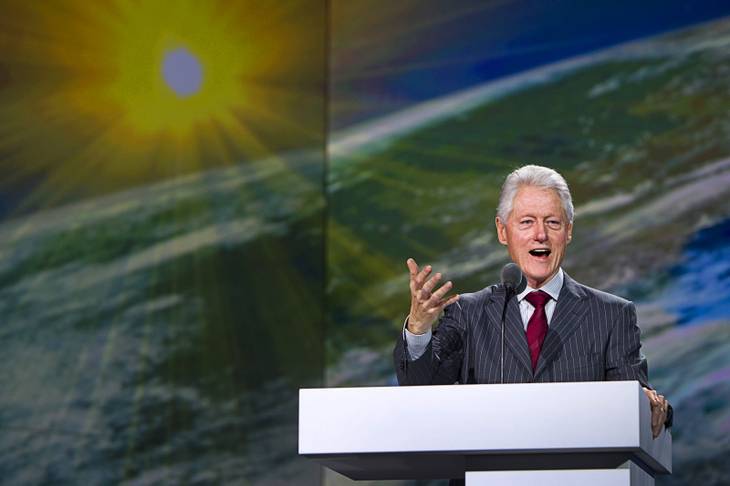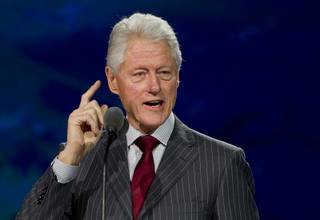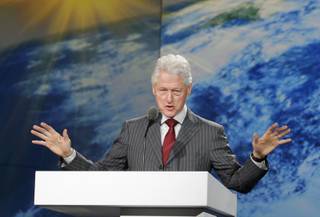Bill Clinton said he's seen technology grow from a few dozen Internet sites to a significant force in influencing global policies.
"When I became president, the average cellphone weighed five pounds," Clinton, the 42nd president of the United States, told an audience this morning at the International Consumer Electronics Show in Las Vegas. "When I took office there were 50 sites on the Internet. More than that has been added since I started talking."
Clinton had been backstage, listening to Samsung President Stephen Woo and developers from across the tech world introduce their new products, including flexible screens for cellphones and tablets to processors that allow video games and movies to fill living room walls.
But Clinton reminded the audience that the technology being shown this week means more than fun and games. He said the developments can help solve controversial problems, from the economy to gun control and climate change.
"It can help us reform our systems," said Clinton, who appeared as a supporter of the Samsung Hope for Children, an initiative to provide technology education for children across Africa. He received a standing ovation when he took the stage of the Palazzo Ballroom inside the Sands Convention Center.
Clinton pointed to how having cellphones had helped fishermen in Sri Lanka boost their incomes by being able to check market prices up the coast. Smart phones and Internet access has also given people in Haiti greater access to banking services.
"I spend a lot of my time in parts of the world where people cannot even take basic systems for granted," Clinton said. "In those places, too, technology can be profoundly important."
Clinton cited a study showing that 10 percent cellphone growth in developing countries provided a half-percent boost in gross national product.
There's still work to be done, however, to keep countries connected. Clinton pointed out that the U.S. ranks 15th in computer download speeds. America has one-quarter of the speed as South Korea, the world's leader.
Samsung's Woo, meanwhile, gave previews of the company's developments in expanding more processing speed with less energy. The company also said it's meeting the growing data demands of more than 6 billion mobile devices. Woo pointed to new memory cells being developed that will allow data centers to process more information faster, using less space and less energy.
Technology alone won't solve the world's problems, however.
"If you look at what the Arab Spring did to use social networks to topple oligarchies, you realize it's not a total solution," Clinton said.
While he said technology can provide better access to information, people have to be willing to listen. Clinton said too often social networks become ideological cocoons.
"The only remaining bigotry we have is we just don't want to be around people who disagree with us," Cllnton said. "We have been sorting ourselves out by our beliefs in a way that weakens our diversity and the potential of the country."
Clinton criticized the gun lobby, for example, saying it has helped overturn the assault weapons ban passed while he was in office by a campaign of fear and misinformation aimed at rural Americans.
"I grew up in this hunting culture but this is nuts," said the former governor of Arkansas. "Why does anyone need a 30-round clips for a gun? Why do they need a 100-round clips?"
Half of all gun deaths in American history have occurred since the assault-weapons ban was lifted, Clinton said.
As another example, Clinton said America just experienced its hottest year on record by one degree.
"Perhaps the deniers will finally be quieted," he said.
Clinton said communication advances have also served to increase awareness about the struggles of women in the Middle East and the problem of human trafficking in the U.S.
"None of them can be solved, unless we are committed to a shared vision," he said.
"Make no mistake about it, climate change will affect us all, (political) stability will affect us all, inequality will affect us all," Clinton added "We will share the future."


